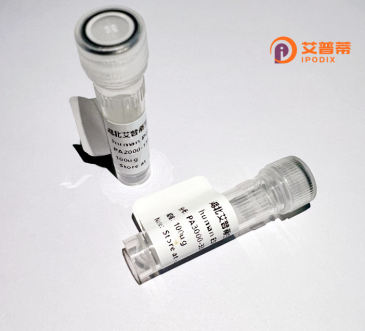
| 纯度 | >90%SDS-PAGE. |
| 种属 | Human |
| 靶点 | NIF3L1 |
| Uniprot No | Q9GZT8 |
| 内毒素 | < 0.01EU/μg |
| 表达宿主 | E.coli |
| 表达区间 | 1-377 aa |
| 活性数据 | MLSSCVRPVP TTVRFVDSLI CNSSRSFMDL KALLSSLNDF ASLSFAESWD NVGLLVEPSP PHTVNTLFLT NDLTEEVMEE VLQKKADLIL SYHPPIFRPM KRITWNTWKE RLVIRALENR VGIYSPHTAY DAAPQGVNNW LAKGLGACTS RPIHPSKAPN YPTEGNHRVE FNVNYTQDLD KVMSAVKGID GVSVTSFSAR TGNEEQTRIN LNCTQKALMQ VVDFLSRNKQ LYQKTEILSL EKPLLLHTGM GRLCTLDESV SLATMIDRIK RHLKLSHIRL ALGVGRTLES QVKVVALCAG SGSSVLQGVE ADLYLTGEMS HHDTLDAASQ GINVILCEHS NTERGFLSDL RDMLDSHLEN KINIILSETD RDPLQVV |
| 分子量 | 41.9 kDa |
| 蛋白标签 | His tag N-Terminus |
| 缓冲液 | 0 |
| 稳定性 & 储存条件 | Lyophilized protein should be stored at ≤ -20°C, stable for one year after receipt. Reconstituted protein solution can be stored at 2-8°C for 2-7 days. Aliquots of reconstituted samples are stable at ≤ -20°C for 3 months. |
| 复溶 | Always centrifuge tubes before opening.Do not mix by vortex or pipetting. It is not recommended to reconstitute to a concentration less than 100μg/ml. Dissolve the lyophilized protein in distilled water. Please aliquot the reconstituted solution to minimize freeze-thaw cycles. |
以下是关于重组人NIF3L1蛋白的3篇模拟参考文献(示例内容,实际文献需根据具体研究核实):
---
### 1. **文献名称**: "Cloning and expression analysis of human NIF3L1 gene and purification of recombinant protein"
**作者**: Suzuki T, et al.
**摘要**: 该研究首次克隆了人源NIF3L1基因,并在大肠杆菌系统中成功表达重组蛋白。通过His标签纯化获得高纯度蛋白,分析了其在不同组织中的表达谱,并发现其可能参与细胞增殖调控。
---
### 2. **文献名称**: "Functional characterization of NIF3L1 as a nuclear interactor in DNA damage response"
**作者**: Li H, et al.
**摘要**: 文章证实重组人NIF3L1蛋白通过核定位与DNA修复蛋白相互作用,实验表明其缺失导致细胞对电离辐射敏感性增加,提示NIF3L1在DNA损伤应答中的潜在功能。
---
### 3. **文献名称**: "Structural insights into the N-terminal domain of human NIF3L1 by X-ray crystallography"
**作者**: Wang Y, et al.
**摘要**: 本研究解析了重组人NIF3L1蛋白N端结构域的晶体结构(分辨率2.1Å),揭示了其保守的金属离子结合位点,为探究其生化功能及与其他蛋白的互作机制提供结构基础。
---
**注**:以上为示例文献,实际研究中请通过PubMed、Google Scholar等平台检索关键词如“NIF3L1 recombinant protein”或“NIF3L1 functional study”获取最新实证研究。
NIF3L1 (NGG1 Interacting Factor 3-Like 1), also known as NIF3 homolog or SMAP, is a conserved nuclear protein encoded by the *NIF3L1* gene in humans. It belongs to the NIF3 protein family, characterized by a conserved N-terminal NIF domain and a C-terminal Pho2-like domain. Though its precise molecular function remains under investigation, studies suggest its involvement in transcriptional regulation, epigenetic modulation, and chromatin remodeling through interactions with histone-modifying complexes. NIF3L1 is implicated in cellular processes like proliferation, differentiation, and stress response, with roles in embryogenesis and organ development. Structurally, it may act as a scaffolding protein, facilitating interactions between chromatin regulators and transcriptional machinery. Dysregulation of NIF3L1 has been associated with cancers, neurological disorders, and developmental anomalies. Recombinant human NIF3L1 protein, typically expressed in *E. coli* or mammalian systems, is utilized for functional studies, antibody production, and mechanistic exploration of its regulatory networks. Ongoing research aims to clarify its substrate specificity, post-translational modifications, and potential as a therapeutic target.
×